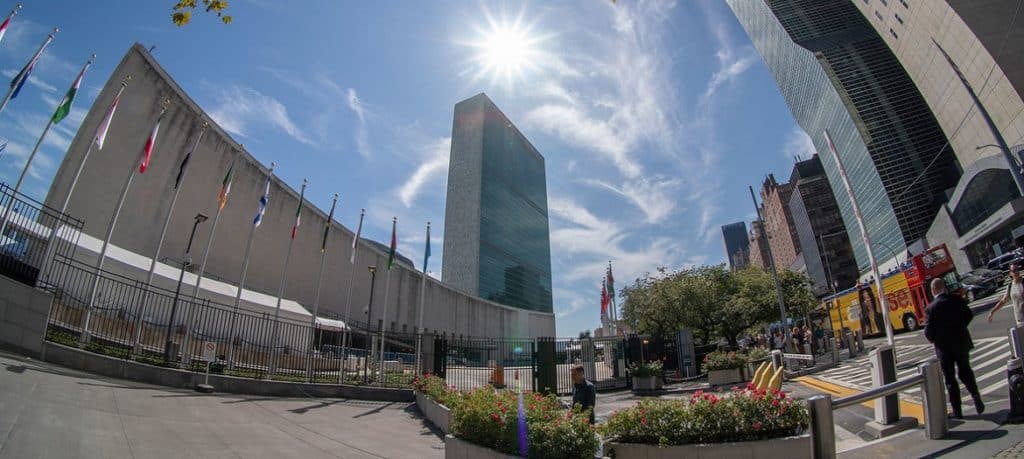By Cristobal Rodriguez Flores
Seventy-five years ago most nations came together to celebrate the San Francisco conference and the creation of the United Nations (UN) to ensure international security and peace.
The world has never been a peaceful place. However in the past, in some cases, United Nations interventions have been helpful in mitigating conflict and preserving peace.
While, over the past decade, the United Nations has become essentially just an organization in which countries implement their agendas for their own benefits, and not for world peace and security. Furthermore, only five countries (China, the United States, Russia, France and the United Kingdom) have the final say, while three of them (China, the United States and Russia) are fighting to gain world political and economic leadership.
Relations between China and the United States, especially with the Trump Presidency, have become complicated and tense, with repercussions on the international system, currency fluctuations and the crisis of multilateralism.
China has grown in all aspects in recent years, but recently the Asian giant has been in trouble due to some internal and international issues. A new law, called “Hong Kong Security Law”, gives the Chinese government, among other things, the possibility of arresting and judging the people of Hong Kong within Chinese territory, and greater powers inside the Hong Kong region.
However, this law violates the agreement entered into force on 1 July 1997 between China and the United Kingdom, where the United Kingdom hands over Hong Kong’s sovereignty to China on the basis of a “Constitution” which guarantees the autonomy of Hong Kong from China for 50 years (so ending in 2047).
Xi’s government passed this law by also taking advantage of the pandemic situation we are facing, including from the Hong Kong law prohibiting the gathering of over 8 people in order to reduce Covid-19 infections (and thus limiting the possibility of demonstrations of protest).
In response, the UK government said it could accept 3 million Hong Kong people, born before 1997, that they could apply for British overseas nationality and likewise live in the United Kingdom and after 12 months they could have applied for British nationality. Xi’s government responded by threatening economic sanctions, which could create many problems for the United Kingdom, also taking into account Brexit and the consequent need to increase economic and political relations outside Europe.
Meanwhile, the United States government has deployed two aircraft carriers (USS Ronald Reagan and USS Nimitz) in the southern China Sea (each aircraft carrier carries 70 combat aircraft) and 4 warships. American Admiral George Wilfoff said that this deployment of forces serves to show that the United States’ allies in the region are not alone. Japan, Taiwan and South Korea have also joined the deployment of U.S. ships, so further straining US relations with China.
In addition, the Trump administration blames China for mismanagement of the coronavirus, accusing the Chinese government of hiding the virus until it was too late. Trump also withdrew support for the World Health Organization (WHO), giving Beijing the opportunity to increase China’s role in the global health system, and creating a power vacuum that weakens the United States’ presence.
The Trump administration seeks to strengthen control of the Middle East region, with the help of Israel and Saudi Arabia, including with support for Israeli government annexations to the West Bank, condemned instead by the international law.
Israel believes that the lands, that were occupied since the end of the six-day war in 1967 belong due to historical and religious rights. The territory that the Netayahu government claims represent 30% of the West Bank territory and are strategic to control the region. Many governments, and organizations like the European Union, are calling for a peaceful resolution. United Nations intervention is not an option, because the Trump administration can veto any decision.
The annexation began on July 1st. But the Netanyahu government must move faster in taking control of the lands because the results of the upcoming American presidential election could change the geopolitical conditions, if the democratic candidate Joe Biden wins.
On the other hand, the desires for control of the Arctic sea are on the rise. Six countries (Russia, Canada, the United States, Norway, Denmark and the United Kingdom) plus China want to secure their control of the sea.
The Arctic sea allows, among other things, to reduce transfer times by up to 40% less than the Suez canal. The United States has spent $ 700 million on the construction of icebreakers. At the moment, Russia is the only country that has icebreakers, so Moscow leads the competition to control the Arctic. However, the question is, what does China have to do with this? The answer is that China in collaboration with Russia wants to improve and develop the construction of icebreakers by spending more than 100,000 million dollars to diversify their commercial lines what they call “the new polar silk road” together with the One Belt One Road plan. .
Controlling the Arctic sea means having geopolitical, but also geoeconomic control. Russia has an advantageous position because of its size. It is also a geostrategic location, which is why Russia has built more than 10 military bases there, while other countries are doing the same.
The world is changing. Seventy-five years ago, when the UN was formed, it was another world. Today there is more anarchy from individual countries and distrust of international organizations,
This is why the United Nations should change to truly guarantee international peace and order. The United Nations should be stronger and capable of ensuring peace even by force.
Author: Cristobal Rodriguez Flores
(The views expressed in this article belong only to the author and do not necessarily reflect the editorial policy or views of World Geostrategic Insights).







